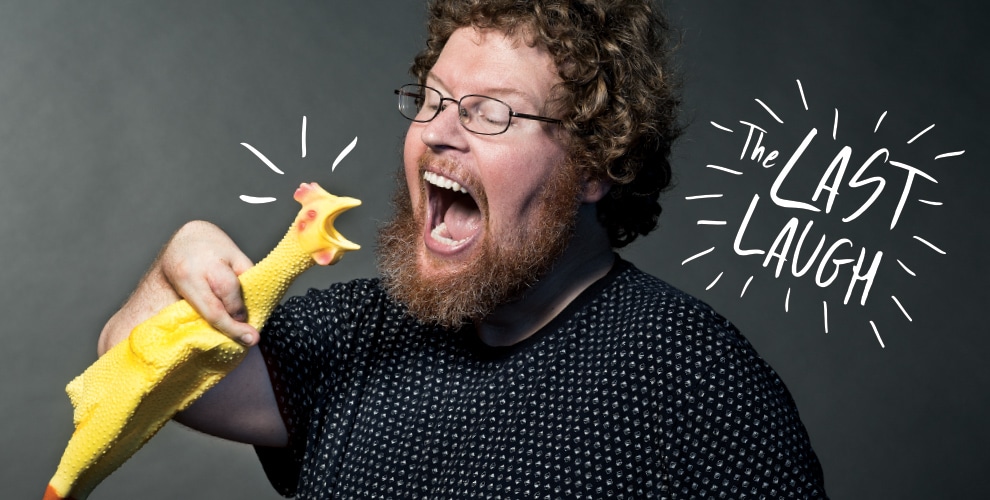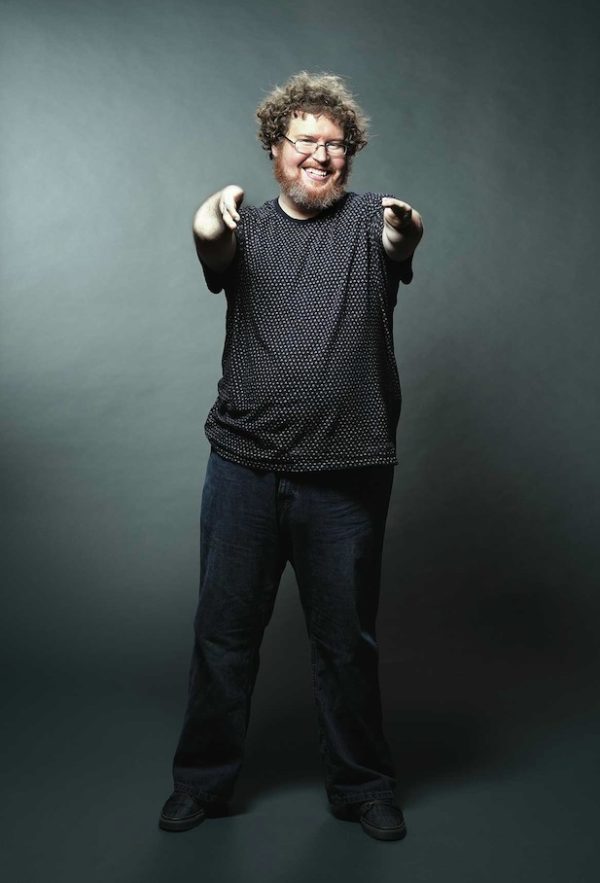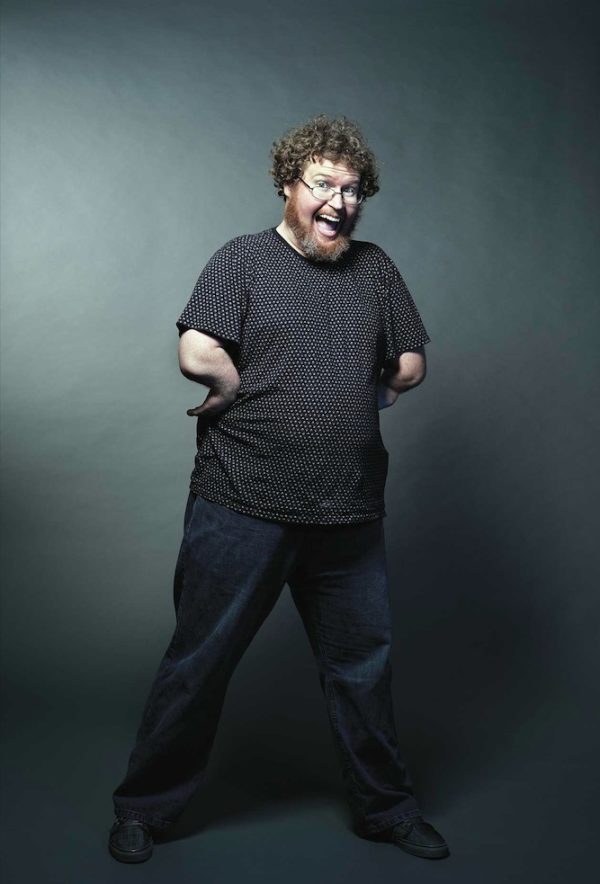
Ryan Niemiller Gets The Last Laugh
You grew up in the tiny town of DeMotte, Indiana. How did that place shape you as a comedian?
Well, we were trailer kids. My dad worked at the steel mills up in Gary. There were six of us in a single-wide trailer. My older brother slept in what was supposed to be the dining room. We had these rickety bunk beds where my younger brother and sister slept. And I slept on the floor. It shaped me a lot. I’m not going to pretend it was fun—it’s weird not having a bed until you’re in college. But I kind of had to start early with learning how to overcome things.
Overcome things like the tornadoes in your jokes?
Yes, when you get told you’re guaranteed to die every time there’s a storm, eventually you’re just like, “Screw it! I’m not even turning off the Nintendo!”
How did laughter play into your coping with poverty and your disability?
I’m convinced that discovering the power of laughter early on saved me. We were such a small community that there was no one who looked anything like me. I was one of one. So I learned fast that I had to make the jokes first. Kids are mean. It’s survival of the fittest. And luckily, I learned that right away by watching comedy with my dad. Dad was an alcoholic. He was never physically abusive, but he was an angry and verbally abusive drunk. When he was watching comedians like Gallagher and Dana Carvey, though, he’d be relaxed. I realized that everyone likes to laugh—it could calm down even my dad when he was at his worst. So I learned to harness that power. Otherwise, my childhood would have been a whole lot worse.
You can tell from your comedy that you’ve mastered the art of joking about your disability to break the ice. Does your daily life require a lot of that?
Even when doing something as simple as buying groceries, I have to find a way to make people comfortable around me. Fair or not, people are uncomfortable with disabilities. We don’t talk about them enough to get over it. I have to let them know that I’m OK, because people will offer you help that you didn’t ask for. In every comedy show I’ve ever done, I tell the audience, “OK, we’re going to talk about this.”

On “America’s Got Talent” this summer, Niemiller was a favorite of co-host Terry Crews.Courtesy NBC/Universal
As a kid, did your jokes ever get you in trouble?
Sure. You have to learn to calibrate your skills. Early on, I learned that if I could get laughs, I could get people to do what I wanted. Luckily, I was a good student, and because school kind of came easy to me, I had more time to be a jackass. I was charismatic enough that teachers would get mad, but never furious.
When did you realize comedy could be a career?
That was in high school—but in a roundabout way. I always knew I was a funny guy, but I never thought I was going to do stand-up. I was going to be a pro wrestler. That was always the goal.
You took that goal a lot farther than most kids who dream of joining the WWE.
Yes, I trained to be a professional wrestler for about three months when I was 21. Arm-wise, I could have done it. But my back just couldn’t take the abuse. Luckily, at Indiana State University [where he studied], I had started doing theater and improv—things that were going to help make me a better performer in the ring. And by that point, I realized that I really enjoyed improv and theater themselves. So I was like, OK, I’ll just do that instead.
Why did stand-up win over theater?
I love theater, but when I started to audition for stuff outside of the university where they knew me and knew what I could do, directors were like, “He can’t play this part. He can’t be a leading man, because he looks like this.” With stand-up, I was telling my story. I could control the narrative.
Was it hard to put yourself out there like that?
You definitely have to have thick skin. If the audience doesn’t like something you wrote, it feels like they don’t like you. It’s very personal. With comedy, the only way you can get good at it is by performing in front of strangers. Real people. You could practice your guitar in your room for 10 years and know that you’re good at it, but with comedy, you need to know what other people think. It’s terrifying, but it’s also a rush. When they love a joke, there’s no better feeling in the world.
But you didn’t do stand-up in Indiana before leaving for California. Why not?
There’s actually a really good comedy scene in Indianapolis. But when you’re starting out in Terre Haute, no one tells you that. I thought that everyone was sent to New York or L.A., almost like they were comic factories. So when I graduated from Indiana State, I packed up my ’95 Buick LeSabre and drove to Los Angeles—the only thing holding it together was my misguided hopes and dreams. I had one connection in L.A.: the guy I jokingly call my Sugar Daddy, my friend Nate, a roommate from college. He had an extra room. And as long as I was working, he wouldn’t charge me rent. But as far as comedy went, I didn’t know one damn person. I just did a Yahoo search of “comedy near me.” In Pasadena, there was a club called The Ice House and a $250 class that, when it was over, came with a five-minute spot on the main stage. Through the class, I met all these other comics with connections at other venues. You basically just have to find one place—and not be a jerk. Then they’ll recommend you to other places.
“If we get to the point where my disability stop being a big deal, I won’t talk about it anymore.”
What was the reception like starting out?
Any comedian who says he was good right away is lying. We’re all terrible for a long time starting out. Two things worked to my advantage. One, with my theater background, I already knew how to be on stage, to pause for applause, and find my lights. Second, I have a unique look. I’m different than everyone else on stage. I still had to be funny, but having such a unique look, people gave me a shot. They wanted to hear what I had to say.
And you had a lot to say about your disability.
It was always going to be about me. I leaned into that and I still do, because it’s what makes me different. Sometimes I get complaints that it’s all I talk about. It’s not all I talk about, but even if it was, it’s my life. I have to deal with this. If you want me to stop talking about my disability, stop staring at me in public. Or how about one of you date me. I’ll shut up forever. If I have to deal with the negatives, I should damn well get to experience the positives. And in the end, if people laugh, who cares what I’m talking about?
Was it difficult joking about that?
A lot of it is trial and error and 37 years of experience having a disability. But there’s a very fine line. There are jokes I’ve tried on stage that I think are hysterical, but I just get an “Awwww” from the crowd, like they feel bad for me. That means I messed up. I never want anyone to feel sorry for me. You have to be able to work things just right so that people are in on it with you—so they’re not feeling bad for you or for themselves. I don’t want to feel like I’m lecturing them.
What comedians influenced you growing up?
I watched a lot of Saturday Night Live, and I loved Jim Breuer. Dave Chappelle is brilliant, his ability to take any subject and make it work. And because of the Indiana connection, Jim Gaffigan. I did a lot of Jim Gaffigan impressions when I first started. He grew up in Chesterton, in the same area I did. And I love him because he can talk forever about nothing. He can do three hours on bacon. I also use him as an example when people say, “You talk about your arms too much.” You like Gaffigan, and all he does is talk about food! It’s funny!
Mr. Disarming
During his time on national television, Niemiller delivered a few hilarious—and uncomfortable—jokes.
“Happy to be back here in Los Angeles. I just flew in from Indiana, and boy are my arms missing. That’s United for you.”
“I started trying to get in shape this year with a New Year’s resolution. But did you guys know that with New Year’s resolutions, you don’t have to do them? Nobody follows up. I had an entire cake on January 2. It was amazing.”
“A lot of people get uncomfortable that I want to joke about my disability, but this is my life, this is who I am. You’re on the team now. Come on in. The water’s nice. I’m not getting in—I’ll freakin’ drown. But you guys …”
“I went through a drive-thru a couple of weeks ago, and as I was leaving, the woman at the window signed, ‘Thank you.’ We had been talking the entire time! That’s how I got food. So now I don’t know if it’s just a quirky thing she does or if she thought I had all the disabilities.”
“Say I put on a nice button-up shirt. I want to look fantastic for the ladies in the house tonight. The problem is, if I don’t take one of you home with me, I’m sleeping in a button-up shirt. I can get every button but that top one. I’d be running around the house looking like a crippled cholo, my sadness cape waving in the wind behind me.”
There was more than a decade between your start and your big break with AGT. What was life like as a working comedian?
There’s a saying in comedy: It takes 15 years to become an overnight sensation. That’s pretty much what it has been. Comedy is way harder than people assume. You’re essentially trying to make people who have no reason to care about you at all love you. You have to get them on your side. You spend a lot of time in front of humans to get good at it. For a long time, comedy was just an expensive hobby. I paid way more into it than I got back. I’d drive 10 hours to a gig and sometime get half-priced appetizers as my payment, or maybe a free drink—and I’m a non-drinker, so that didn’t mean anything to me. Those stories on AGT that I told about sleeping in my car, they’re 100 percent true. You do it for the stage time.
Did you ever want to quit?
I never doubted my talent. But there were times when I didn’t know how much longer I could go without health insurance. When you’re in your early 20s, it’s fun to be a starving artist. When you’re 35 and still kind of struggling, it’s hard not to have those thoughts that maybe it’s time to make this a hobby again. Luckily, I was too stupid to quit.

Yes, it taught me how to be a “real comic.” I learned how to be funny for the rest of the country between the coasts. People in Indiana don’t care much about celebrities, how expensive the rent is, or how bad traffic is. Indiana taught me how to be funny for “real” people.
How did AGT come into the picture? Was there resistance to that idea among your friends in the Indiana comedy scene?
If you’re a comedy purist, you look down on the show. But for my unique situation, it was perfect. Because it’s not just about being good at something, it’s also about telling your story and selling your personality. I’ve been trying to get on AGT for five or six years. I think the producers finally understood, OK. Someone who looks like him is relatable and people will come on board with this.
People certainly came on board. What has the reception been like since the show?
I get recognized on the street now, which is strange but flattering. But most of these people know me as the guy from TV. I know me as the guy from the trailer park who worked hard, so I don’t see myself as a TV star.
What has been the response from others with disabilities? Do some people see you as an inspiration?
I’ll be honest: That is never why I started comedy or did AGT. I’d be the last person to try to be inspirational, because who the hell am I? But the tweets and comments and messages thanking me for representing up there were really cool. And parents of kids with disabilities who were like, “I was afraid for my son, but seeing you up there, I know it’s going to be all right. He can be something.” It’s hard not to let that affect you.
Are you leery at all of being pigeon-holed as the “disability comic”?
I don’t worry too much about it. I don’t consider myself a disability comic. I’m just talking about my life. If we get to the point where my disability stops being a big deal, I won’t talk about it anymore. And now, honestly, the pressure is off of me to talk about it because people know my story a little bit. They’re coming in with some information. I can start to transition. My life is more than just dealing with stupid people.
Will you stay in Indianapolis?
My goal is to stay where I am as long as possible. I love it here. It’s a big city with a lot going on, but it still has a small-town feel. Besides, I’m traveling so much right now, I’m basically just paying rent to store my things. Why would I move to L.A. and pay four times the rent just to house my stuff?







